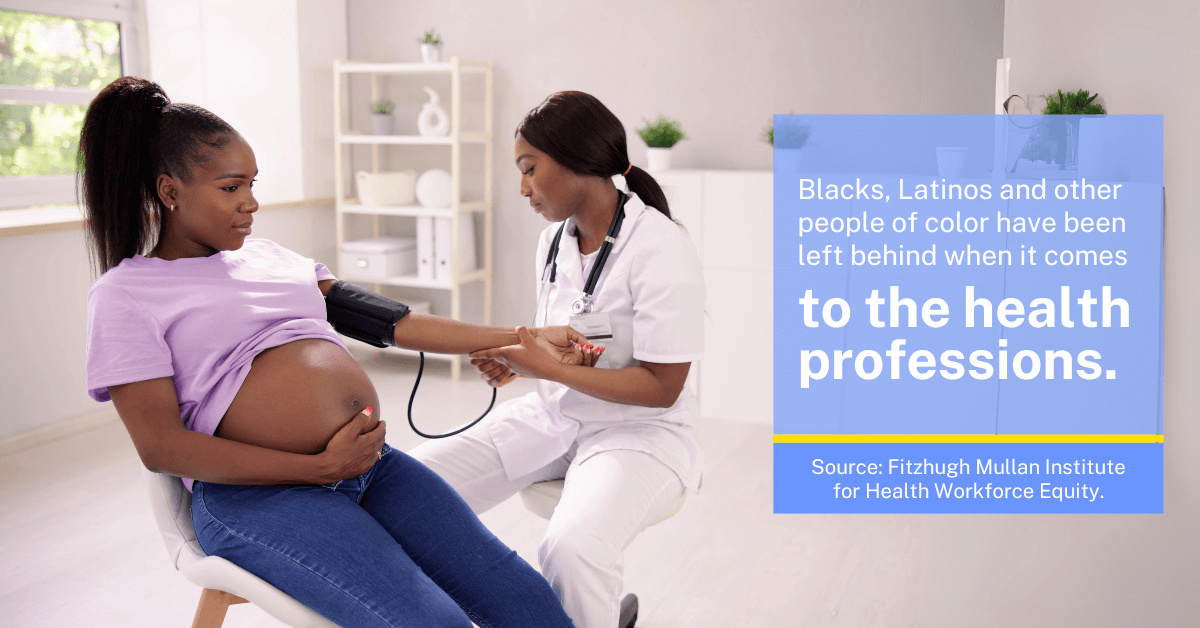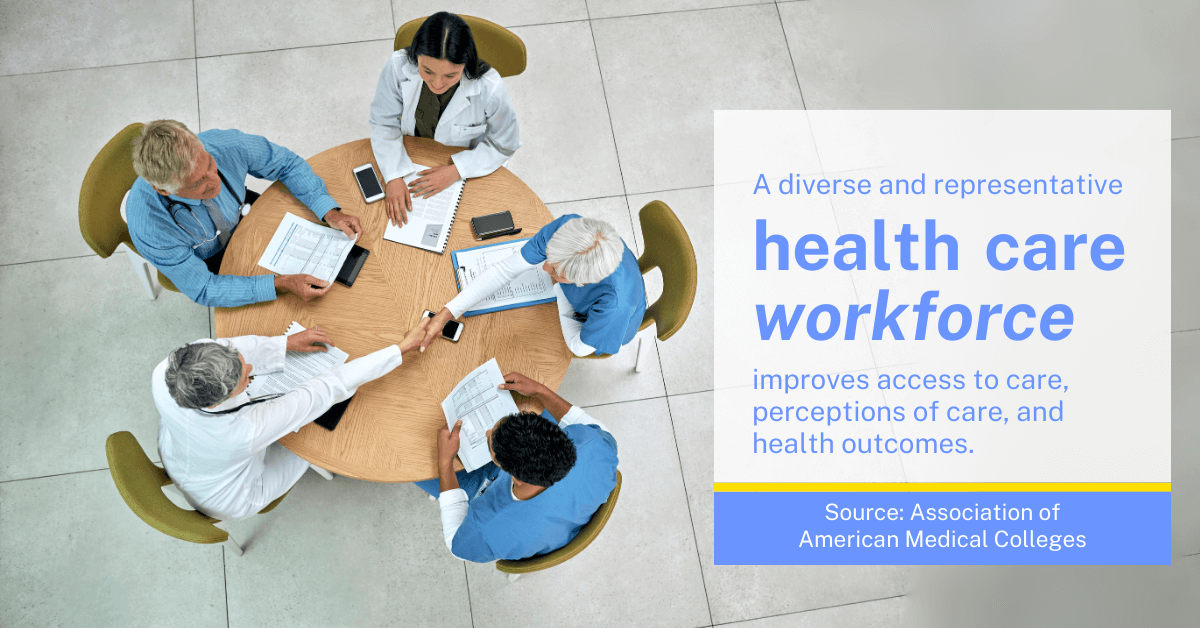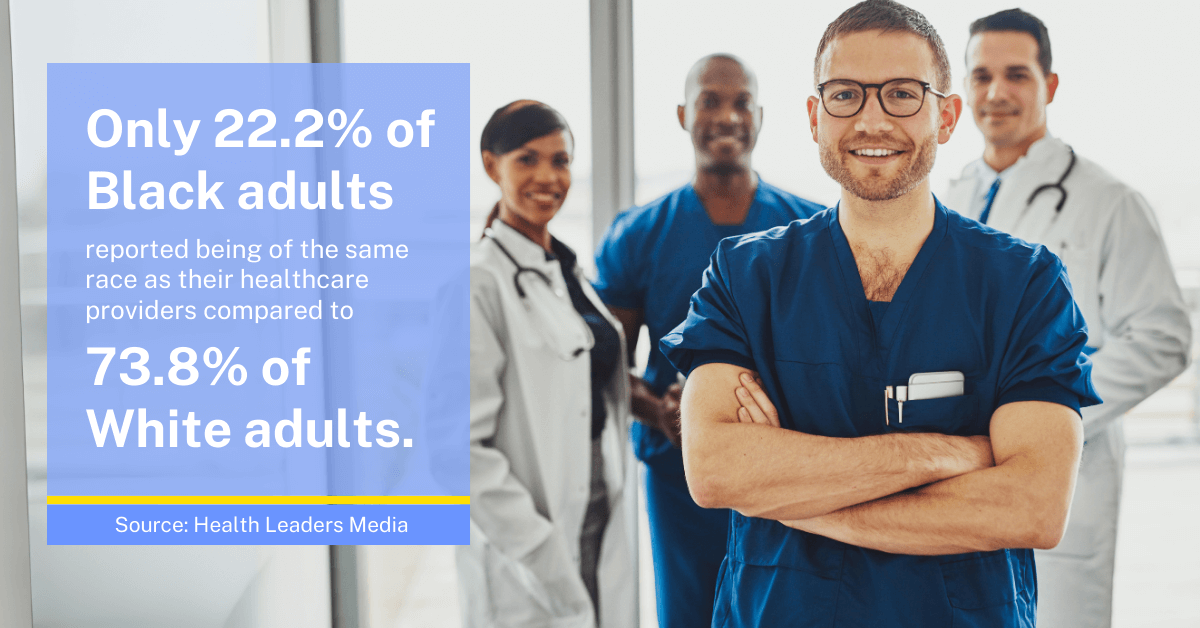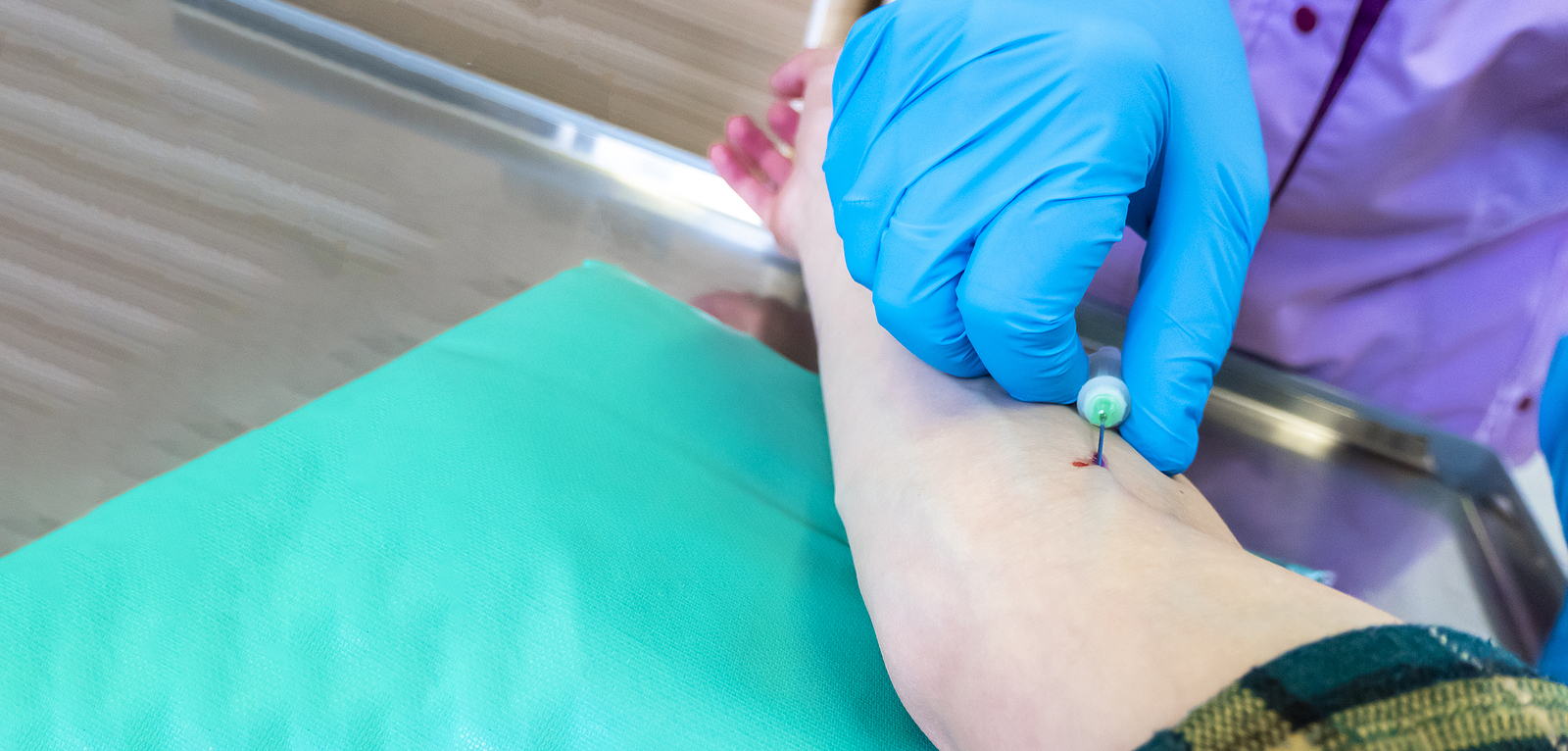Jenny Nguyen, CPT | Updated/Verified: April 19, 2024
Are we doing enough to ensure diversity and representation in healthcare? Diversity advocate Verna Myers states, "Diversity is being invited to the party; inclusion is being asked to dance." The lack of diversity in the workplace, healthcare settings, and classrooms exacerbates the cultural nuances faced by minority groups.
Our resource seeks to bridge the diversity gap between students and instructors, healthcare professionals and patients, and anyone seeking to improve diversity or educate themselves on the longstanding issues facing minorities in healthcare.
Below is a comprehensive selection of government resources, articles, research, podcasts, videos, and more, with a special section on diversity in laboratory sciences roles.
Websites – Government Resources
U.S. Department of Health and Human Services
The Office of Minority Health is part of this government department, which offers initiatives and programs and a resource center filled with free articles.
Centers for Disease Control and Prevention (CDC)
Available from the CDC, this page focuses on minority health and includes links to featured articles and its programs for current students.
National Institute on Minority Health and Health Disparities
Visit this page maintained by the National Institute to discover funding opportunities, current programs, news, and free resources.
CMS Office of Minority Health
The CMS Office of Minority Health offers research and data on health disparities and free resources, such as webinars, for those wanting to learn more.
Agency for Healthcare Research and Quality
The official website of this agency contains many fact sheets on topics such as research into Native groups and other diverse populations.
National Minority Health Month
The National Institute on Minority Health and Health Disparities designed this page to promote National Minority Health Month.
Minority Health and Health Equity
From the US Food & Drug Administration, this site is a helpful resource with information about diversity within clinical trials and similar topics.
Racism and Health
Another page from the CDC discusses the threat that racism poses to public health and how those working in the field can combat it.
Racial and Ethnic Health Care Disparities
The Center for Medicare Advocacy examines how to reduce ethnic and racial disparities within the healthcare industry and why this is important.
Organizations
National Hispanic Medical Association
Better known as the NHMA, this organization offers free resources and programs, such as help for physicians and fellowship information for students.
National Association of Latino Healthcare Executives
Even if you don’t join NALHE, you can use the job board to look for open positions and find local chapters near you.
Latino Caucus for Public Health
The Latino Caucus for Public Health has a podcast and runs special events for members. Information on becoming a member is available online.
Chicanos Por La Causa
See how you can volunteer to help this organization, view open jobs, learn about upcoming events, and check out its unique programs.
UNIDOS US
Designed for Latino people, UNIDOS US offers free fact sheets, information on becoming a member, and an extensive library of free articles.
National Minority Health Association
The National Minority Health Association believes every human deserves healthcare access and offers free helpful resources for visitors.
Black Healthcare & Medical Association
As the top healthcare group for black professionals, this organization offers help for local groups and has tips on how you can get involved.
Black Caucus of Health Workers
Designed to reduce health disparities, the Black Caucus of Health Workers has an annual conference and more minor events to help at the local level.
Association of Asian Pacific Community Health Organizations
This organization, which is open to community groups, focuses on training, healthcare quality, and health access.
Asian and Pacific Islander American Health Forum
The official website of the Asian and Pacific Islander American Health Forum provides COVID-19 resources, information about the organization’s initiatives, and a focus on the issue.
Asian & Pacific Islander Caucus for Public Health
This organization holds an annual conference on healthcare issues and offers free policy, advocacy, and COVID-19 resources.
Asian Health Coalition
The Asian Health Coalition wants to improve local communities’ access to healthcare through multiple programs and free resources.
Women in Healthcare
Women in Healthcare is an organization that offers members access to annual meetings, a free library, and volunteer opportunities.
Women Business Leaders
WBL is a professional organization with a job board, free resources, events, and programs designed for women leaders in health care.
Scholarly Articles
The Importance of Diversity and Inclusion in the Healthcare Workforce
Fatima Cody Stanford holds several degrees and used her background to write this article on why the healthcare industry needs to include more diversity.
Diversity of the Allied Health Workforce: The Unmet Challenge
In this piece, you’ll learn how minority students are underrepresented in major college programs and what this means for the industry’s future.
An Examination on the Low Number of Minority Students in the Allied Health Profession and the Students’ Assessment of Their Clinical Affiliate
This report, a doctoral dissertation from a former student at Argosy University (now defunct), examines why programs have few minority students and what those students think about their experiences.
Racial-Ethnic Diversity in Allied Health
This online article explains the lack of ethnic and racial diversity in allied health professions and college programs.
Health Disparities: A Barrier to High-Quality Care
The authors of this piece look at the barriers that prevent minority groups and others from getting the health care they need and how the disparities affect them.
Recruitment of Minority and Underserved Populations in the United States: The Centers for Population Health and Health Disparities Experience
This article looks at how recruitment efforts based on professionals’ experiences have both helped and hindered diversity in healthcare fields.
Increasing Minority Representation in the Health Professions
This article, published in the Journal of School Nursing, focuses on how new health programs can increase minority representation in certain fields.
Minority Representation in Healthcare: Increasing the Number of Professionals Through Focused Recruitment
This online article from Health Topics discusses the benefits of a diverse workforce and how recruitment can increase professional opportunities.
Under-Represented Minorities in Emergency Medicine
Several authors worked on this piece to discuss why few minorities work in emergency medicine and how to improve their numbers.
Developing Workforce Diversity in the Health Professions: A Social Justice Perspective
Workforce diversity is a social justice issue, and this article focuses on the challenges facing those who want to work in the field.
Understanding and Addressing Racial Disparities in Health Care
Find out more about racial disparities in health care and how you can understand them and address the issue.
The State of Health Disparities in the United States
The National Library of Medicine shared this article to go over the current state of health disparities in the US and its impacts on the future.
Articles and Reports
Lack of Diversity in Healthcare Workforce Has Negative Effects on Patients of Color
In this article, Christopher Cheney discusses the disparities within the healthcare industry and their negative impacts on people of color.
Disparities in Health and Health Care: 5 Key Questions and Answers
This simple article from KFF explores the main questions about health disparities and provides in-depth answers.
Missing Persons: Minorities in the Health Professions
The Sullivan Commission released this report to discuss why health disparities exist and how holding others accountable can help.
Barriers and Opportunities for Promoting Health Professions Careers Among African American Students in the Midwest
This article, published in the National Journal of Medicine, focuses on how reducing barriers and offering new opportunities can reduce disparities in the Midwest.
Breaking Barriers for Underrepresented Minorities in the Health Professions
Students at UCSF released this study to discuss how to remove the barriers that block minorities from entering the healthcare profession.
An Analysis of Underrepresented Minorities’ Exposure to Allied Health Fields
This simple presentation provides a detailed analysis of underrepresented minorities and breaks down the information easily.
Facilitating Racial and Ethnic Diversity in the Health Workforce
The Center for Health Workforce Studies released this PDF detailing how organizations improved ethnic and racial diversity.
End of Year Legislation Creates New Allied Health Workforce Diversity Program
Abe Saffer covers current research and discusses the Allied Health Workforce Diversity Act that President Biden signed in 2022.
The Case for Diversity in the Health Professions Remains Powerful
Read this article to learn about why diversity is so important in the healthcare field and the best ways to promote it.
Why America Needs More Diversity in the Doctor's Office
In this commentary, you’ll learn why the general public needs doctors who look like them and how diversity can lead to better treatments.
The Benefits of Diversity in the Healthcare Sector
This piece touches on topics such as reducing diversity, learning how to promote diverse programs, and building trust.
Why is Diversity Important in Healthcare
Andrea Mosher uses simple language to discuss why diversity is an essential thing that the healthcare sector needs.
Podcasts
Diversity and Inclusion Podcasts
The AHA Institute for Diversity and Health Equality has a database of free podcasts on inclusion and diversity that helps you learn more.
The DEI Shift
This podcast includes discussions on major diversity topics and sponsored episodes that bring in significant professionals.
Healthy with VCU Health
Healthy with VCU Health was launched in 2023 to give VCU Health System professionals a safe space to discuss their challenges and issues.
Diversity in Healthcare: The RN Perspective featuring Anna Marie Valdez
Valdez is a working nurse and the focal point of this podcast, allowing her to discuss racism within the nursing field.
Permanente Medicine
In this popular podcast episode, two doctors came together to discuss improving health equality and their experiences in the field.
Increasing Diversity in Public Health
This podcast, from the University of Michigan School of Public Health, discusses the school’s program and others that provide minorities with access to education.
Uncomfortable Truths, Inspiring Perspectives: A Round Table Discussion on Diversity, Equity & Inclusion with Young Health Professionals
Five professionals working in health care come together with their mentors to discuss the challenges and issues they faced in this podcast.
1619
This popular podcast from the New York Times discusses the roots of slavery in the US and how it has lasting effects even today.
Reveal
Every episode of Reveal investigates a new topic, such as how some states restrict access to specific treatments and what this means for minorities.
What Will It Take to Diversify Medicine?
This podcast, which is a collaboration between Dr. Jaya Aysola and Penn Medicine, covers the medical community’s challenges.
Videos
Diversity, Equity & Inclusion in the Health Professions
Roseman University designed this video to discuss the need for more diversity, inclusion, and equity in the health professions.
Why Is Healthcare Workforce Diversity Important?
Nearly 7,000 people watched this video from professionals working in the field about why a diverse health workforce is necessary.
Diversity in Healthcare
Learn more about diversity in healthcare in this simple video, which also examines the factors that led to the problem.
4 Reasons Why Diversity in Healthcare is Important
Training Express examines why healthcare diversity is essential and provides four primary reasons.
Diversity in Healthcare
Though this video is a little long, at 43 minutes, it does an excellent job of reviewing the need for improved diversity in modern healthcare.
Tour for Diversity in Medicine
Multiple healthcare professionals gathered for this video, discussing what led them to the industry.
Inclusion and Diversity: Inspiring Change in Healthcare Organizations
Spend an hour watching this video to see the steps some organizations recently took to become more diverse and inclusive.
HPNF Launches Free Diversity in Health Care Video Series
This series features multiple videos tackling tough subjects like why diversity matters and the lack of diversity.
Cultural Awareness for Healthcare Professionals – Promo (English version)
It doesn’t take long to watch this short promo that allows professionals to mention what diversity means to them briefly.
Diversity and Inclusion Video Learning Series
The AAMC created this series to help interested viewers easily access some of the complex diversity and inclusion topics.
How Diversity Shapes Healthcare
Find out how the healthcare landscape changes due to diversity in this short video that takes less than a minute to watch.
Selected Videos from Adelphi University
Cultural awareness and sensitivity to patient’s needs are just some of the issues addressed in this Adelphi University video series.
Scholarships
RCC Foundation
The RCC Foundation has multiple scholarships open to members, including deadlines and application requirements on its site.
Association of Schools Advancing Health Professions
This association offers a Scholarship of Excellence that awards $1,000 to one student who joins the organization and completes all steps.
Iowa Vocational Technical Tuition Grant
Full-time students enrolled in a vocational or technical school in Iowa can apply for this grant, which provides $1,200 per year for two years.
Iowa Department of Education
The Iowa Department of Education provides resources, such as scholarship links, for current and future students who need help paying for college.
Washington State Opportunity Scholarship
WSU has a special scholarship for students interested in technical programs, prioritizing those who will work in rural areas.
Allied Healthcare Scholarship Program (AHSP)
Find out how you can apply for this scholarship program to get money to pay for college expenses at schools in California.
The Gates Scholarship
This scholarship, available from The Gates Foundation, is awarded to students with leadership skills with a history of success.
HOSA Scholarship Application
Due by April 15, this application helps you apply for multiple scholarships designed for future healthcare professionals who need financial help.
2024 HSF Scholar Program Application
The Hispanic Scholarship Program Application lets you apply for multiple scholarships of up to $5,000 from this organization.
IHS Scholarship Program
Alaskan Natives and American Indians enrolled in health science programs can apply for one of these scholarships.
Patsy Mink Foundation
The Patsy Mink Foundation awards $5,000 in scholarships to low-income women with financial need who attend an accredited school.
Higher Education Scholarships
Apply by the posted deadline to be considered for one of the more than 20 $2,000 scholarships granted to select students.
Laboratory Sciences
Cultural Diversity and the Phlebotomist
See a sample of this course from LabCE that allows you to earn course credit as you study cultural diversity and its importance in the field.
Diversity, Equity, Inclusion — Managing and Leading Today's Diverse Laboratory Workforce
This article explains the programs many workplaces offer to improve diversity and inclusion while promoting employee equity.
Equality and Diversity
Phlebotomy Training Services created this PDF guide to help others in the workforce discover how they can improve equality and diversity.
Foster a Diverse, Equitable, and Inclusive Profession
The American Society for Clinical Pathology shows readers how to get involved and why diversity matters professionally.
The Effects of Education and Training Given to Phlebotomists for Reducing Preanalytical Errors
In this article, you’ll see both the results and effects of proper training on phlebotomists in reducing their errors at work.
Health Equity, Diversity, and Inclusion
See why gender and cultural inclusion are important in this article, which also examines why diversity matters in health care.
A Historical Perspective on Diversity in Clinical Laboratory Sciences Programs
In this article, you’ll see the history of diversity in clinical laboratory programs and how the number of minority students changed.






